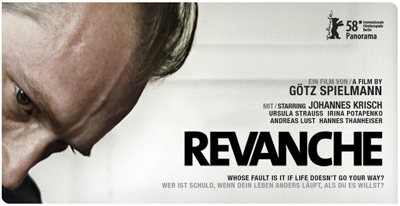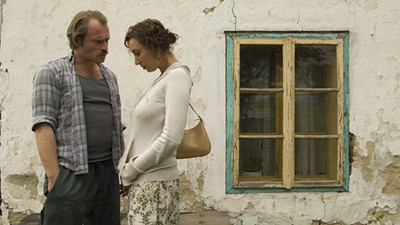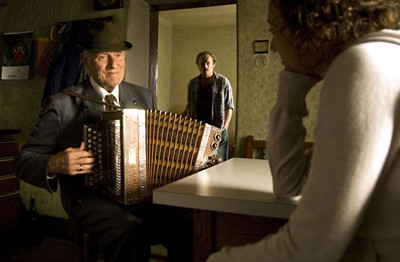
The tagline for the U.S. release of the Austrian film Revanche (which translates as "revenge") is "Whose fault is it if life doesn't go your way?" For a marketing line, it's a fairly savvy, if somewhat simplistic, distillation of the existential quandary that the various characters in Götz Spielmann's movie find themselves in. At some point, they all want to blame someone else for what has happened, but no one can ever go through with it. The choices they made were their own, and how that affected their lives as well as the lives around them is their own burden to carry.
Revanche begins by showing two seemingly divergent but ultimately connected storylines. On one end of things, we have the troubles of a young couple in the Vienna underworld. Alex (Johannes Krisch) is a hired hand in a brothel, secretly dating the owner's favorite girl (Irina Potapenko). The boss calls her Angel, but her real name is Tamara, and she's an immigrant who has turned to prostitution due to her accumulated debt. Alex is an ex-con with dreams of buying into a bar in Ibiza. If he could get enough money for that, he could get enough to buy out Tamara's debt, as well.

Elsewhere, a young police officer, Robert (Andreas Lust), is trying to climb the ranks of the force that patrols the small village where he lives with his wife, Susanne (Ursula Strauss). They are also trying to start a family, but Susanne's first pregnancy ended in miscarriage, something to which their already finished nursery serves as a painful reminder. The fault isn't with Susanne, though, their problems getting pregnant stem from Robert, who is stressed out at his job. It's performance issues all around for Robert, who is, ironically enough, quick with the trigger on the firing range and also a bit of a coward. Father material? Not really.
Connecting these two couples is Alex's grandfather (Hannes Thanheiser). The old man lives on a farm on property adjoining the country home of Robert and Susanne. It's upon visiting his grandfather and seeing the town he lives near that Alex works out a plan for robbing the small bank there. Tamara is against the idea, she doesn't want Alex going back to jail, but when the crime boss starts putting pressure on her to go full-time as a kept woman for his special clients, it forces Alex's hand. He pulls the job, but it brings the crooks in contact with Robert--and that's when things start to get dicey.

Despite its criminal setting, Revanche isn't really a nail-biter like your average crime thriller; it is, however, that most unique of human dramas, the kind of interpersonal story that moves like a crime picture. By that I mean that it is full of twists and turns that are impossible to predict, especially since Spielmann, who both wrote and directed Revanche, is so good at avoiding telegraphing what choices his subjects will make next. How Robert will react to the bank robbery and how Alex will become intertwined with Susanne are just a couple of the surprising and wholly unexpected story developments. These are characters who make decisions based on the situation at hand, as opposed to following some pre-determined script outline. Thus, Revanche keeps the viewer on the edge of his or her seat regardless of the level of danger in the plot.
Revanche was shot entirely on location, and there is grainy, underlit realism to Martin Gschlacht's cinematography that is both alluring and haunting. In terms of style, Revanche calls to mind other Eastern European movies of recent memory, most specifically 4 Months, 3 Weeks and 2 Days

All of the acting in Revanche is of excellent quality, but Johannes Krisch most distinguishes himself with his largely interior, fiery turn as Alex. A criminal by circumstance rather than natural demeanor, he has a false tough guy exterior that careful observers see is outweighed by a stronger moral code. The head of the bordello sees his weakness, and an impulsive act of chivalry on Tamara's behalf is what ultimately proves to make their situation in Vienna untenable. He may be willing to rob a bank, but he does so with an empty pistol, lest someone get hurt; likewise, there may be friction between him and his grandfather, but Alex's extended stay brings out a familial love that both men are reluctant to express, suggesting that playing one's emotional cards close to the vest is a family trait. Susanne even asks Alex what happened to him to make him so hardened, a question to which he has no answer.
In the end, all of the players in this drama will have to come to terms with what they have done or else they will never move forward. Robert stands as the lone holdout, refusing to accept his role in unfortunate circumstances, choosing instead to try to make himself the victim of those same circumstances. As a result, he is the most tortured, whereas the others come to grips with the fact that they are agents of fate in their own lives. Decisions made are decisions that one must stand by, regardless of how harsh the consequences. Everyone has their secrets, too, and shared knowledge cancels them out. What you know about another is only valuable when that other doesn't know anything about you. Maintaining one's own peace is often as simple as living and letting live--and, as is often said, that is the best revenge.

No comments:
Post a Comment